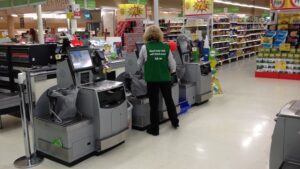Lawmaker Wants to Regulate Self-Checkout Lanes

Nobody likes self-checkout," CNN reminded us in 2022, something that has been true for decades. First introduced in Florida, the beachhead of so many other invasive species, the technology was not liked by large majorities of consumers right away. From the get go," CNN quoted an expert as saying, customers detested them." Given this response, many stores quit using them at least for a while. But like the giant Burmese python, Gambian pouched rat, New Guinea flatworm, and Elon Musk, self-checkout has proven harder than expected to get rid of.
In February, a Washington state lawmaker introduced House Bill 1739, which would put at least some restrictions on self-checkout in grocery stores. The bill would apply only to retail groceries that are over 15,000 square feet in size, so almost as big as your managing partner's house, and would impose the following requirements:
- At least one manual checkout station would also have to be provided;
- Self-checkout stations would be limited to 15 items per customer;
- No more than two stations could be monitored by any one employee; and
- The employee monitoring them could not be Elon Musk or anyone associated with Elon Musk.
The bill would also require self-service checkout to be included in the analysis of potential work hazards for purposes of any accident prevention programs required by law." Does self-service checkout pose potential work hazards for employees? Apparently the people forced to use it do:
On a particularly hard day, a woman threw a steak at me because her item did not qualify for a bogo deal we were running," said Bellevue grocery clerk James Reed. I would have overridden the machine given the chance. She just didn't give it to me."
Of course, throwing a steak at someone is assault, not an accident," so maybe the bill wouldn't require analyzing such risks. In any event, I think we can all agree that the worst crime described above is writing bogo" as if it were a real adjective and not (presumably) an acronym for Buy One Get One [Free]." Maybe she threw the steak at him because he said it was a bogo deal"? No jury of me would convict her for that.
The bill is primarily intended to protect grocery workers, although not from flying meat specifically. It seems aimed at preventing their jobs from being transferred to consumers (who don't want that job anyway, so it indirectly protects them too). Employees could file a complaint with the state's Department of Labor and Industries, and an employer found to have violated the law could be required to pay up to $10,000 in civil penalties. Or, of course, aggrieved employees could bring an action in superior court to get their jobs back or to recover lost pay or benefits. Most importantly, of course, they could also recover attorneys' fees if they prevail. That just always makes sense.
Critics of the proposal said it would deprive stores of the flexibility they need to address worker safety (teaching workers to duck, maybe) and another significant problem: theft.
As CNN noted, the deployment of self-checkout lanes was quickly followed by the deployment of techniques for exploiting self-checkout lanes, such as scanning counterfeit bar codes or the far simpler techniques of not scanning an item" or scanning everything and then walking out without paying." Also, customers make mistakes. Consumers are not very good at scanning reliably," one expert was quoted as saying. Why should they be? They're not trained." Because of mistakes and theft, he had estimated, a store where 50% of transactions involved self-checkout would experience losses 77% higher than average.
Another expert pointed out that although stores might save money by replacing some human cashiers, the machines still require enough supervision" and regular maintenance, often involving better-paid IT workers, that they may not save money overall. In short, he opined, self-checkout delivers none of what it promises."
So, CNN concluded, if most customers hate it and the technology delivers none of what it promises, it only makes sense that self-checkout is here to stay." Wait, what? Yes, despite self-checkout's many shortcomings for customers and store owners, the trend is only growing," CNN suggested, noting that some retailers are planning or even operating stores (e.g. Amazon Go) that have no cashiers at all. Why turn everything over to a mildly functional technology that people hate? It's an arms race," said one former grocery executive. If everyone else is doing it, you look like an idiot if you don't have it." I guess that's a reason, it just isn't a good one.
It's basically the same thing I keep hearing about generative AI. Lots of people hate it and it doesn't deliver what it promises, so it's definitely here to stay. Everybody's doing it! Not me, and not you either if I'm supervising the project. I guess I can't stop you from using it, but if I find out I will absolutely throw a steak at you. And not a good one, either.







 Related Stories
Related Stories